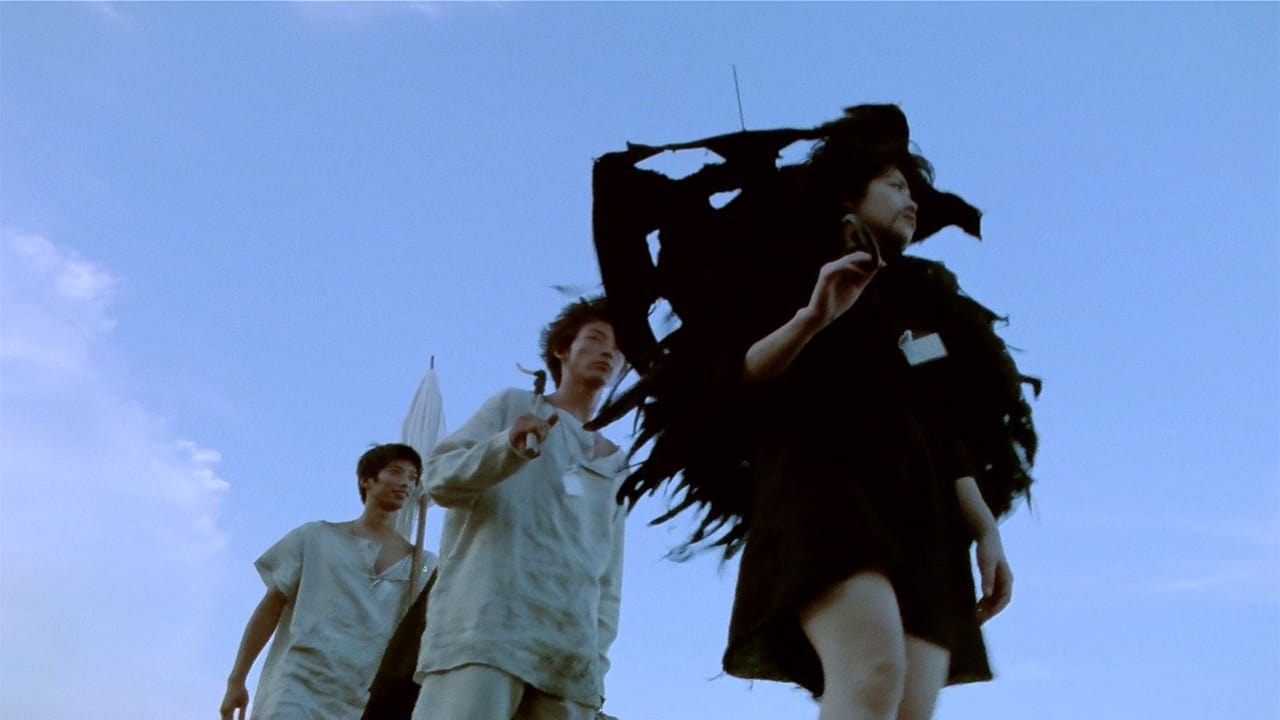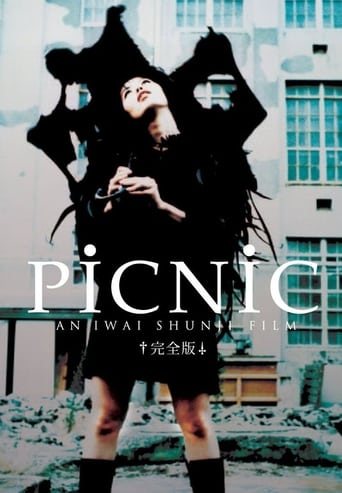

Iwai's Swallowtail and Love Letter are two of my favourite films. Asano and Chara are high calibre actors, and there are the stunning visual set pieces we've come to expect from Iwai, including the most arresting, startling suicide death ever committed to celluloid, a thing of sheer beauty. Unfortunately, the story is just too flimsy. The characters are not developed beyond their prognosis; Asano's demon makes disturbing hallucinatory appearances, but apart from that back story the rest is just three mentally disturbed people walking (and walking, and walking...) on a wall. There seems to be a short version and an extended version kicking about - I had the extended version, and it felt long. This seems to work better as a short film. The pseudo-Christian references are lame, a bum note in an otherwise passable effort. Thankfully, Iwai paid more attention to script in his later outings. This early one is strictly for fans looking to chart the director's development.
... View MoreIn Picnic, director Shunji Iwai has crafted a short film of visual beauty and lyric poetry. Three young inmates at a mental institution walk along a wall connecting the hospital to the outside world and simply keep going, perhaps a metaphor for the Jungian idea of the long journey back to the genuine self. As they travel on a ledge between the ground and the sky, each in their own way attempts to liberate themselves from their inauthenticity and recapture the experience of wholeness. The inmates are Coco, played by Chara, a Japanese pop singer who would later star in Iwai's Swallowtail Butterfly, Tsumuji, performed by Tadanobu Asano, now the husband of Chara, and Satoru (Koichi Hashizumi).The first twenty minutes are set inside the institution. A reluctant Chara is delivered to the hospital by her parents and is subject to abuse and mistreatment by a female attendant. Tsumuji has murdered one of his teachers who was abusing him and sees the dead man's ghost before him in a very disturbing sequence. It is not clear why Satoru is there but we see scenes of him masturbating excessively. As the three find a common bond, they set out on their journey, first encountering a young choir at a Christian church singing an otherworldly hymn. They are befriended by the priest who gives them a bible even though Tsumuji says he is a non-believer.When the boy reads the publication date, however, he concludes that will be the day the world will end and the three decide to have a picnic at the nearby lighthouse to wait for the fateful moment. As they prepare to witness the world's end, they open up to each other with a childlike innocence and acknowledge their wrongdoing. Elizabeth Lesser says, "The price for staying heart blind is a life unlived". The Dalai Lama has gone as far as saying that "the tendency to avoid problems and the emotional suffering inherent in them is the primary basis of all mental illness". As they talk to each other and begin to make connection, they become real people not "mental patients".While the film's meaning may be different to each viewer, to me it is saying that we should live our life as if the world will end tomorrow, be in touch with the beauty of each moment, and acknowledge the actions in our life that may have harmed others. Whatever the message, Picnic is a stunning achievement, each scene capable of standing alone as a unique work of art. In spite of a sadness that reminded me of my own dark moods of adolescence, it left me with a feeling of transcendence.
... View MoreI wonder why people said it lasted for 47 minutes when I have a 67 minute version. That certainly moves the film out of the short film category, I think.Anyway, this is a movie filled with symbols so that what seems a weird journey of three mental patients touches subjects like religion, sin, regret, without being religious.Two boys and a girl leave from a mental institution by walking on a wall. Normal people cannot go on the wall, they would fall down, like a cop that tried to stop them did. A priest comes to them on the wall, though, but sits on it, then climbs down on a ladder. After these two events they are armed with a gun and a bible. Going off the wall leads to death, as one of them accidentally falls down and hits his head.The main characters are childish and have different weird views over the world. The girl thinks the world was made by her parents when they gave birth to her and that it's going to end when she dies. The boy thinks the world is going to end and by reading the bible he convinces the others of it. So they decide to go to a picnic at the end of the wall to watch the end of the world. Of course, it's not the destination or the food that is important, but the journey. In the end, the world does end, sort of.I liked this movie, I think I will keep it in my collection. Watch this if you are in a mood for a meaningful low budget film.
... View MoreThis work by Iwai Shunji shows the strengths of the short film genre. Valuing atmosphere and cinematics as much as plot, it avoids the trap many primarily visual movies fall into by being just the right length to catch and hold the viewer's attention. Iwai is at his best here, showing his Christopher Doyle influences (and, thankfully, not his earlier TV-directing influences). He has also managed once again to pull exemplary performances from the cast.The story itself follows three psychologically disturbed people who leave their institution on a misdirected quest. Beyond that it is difficult to avoid saying too much, as, after all, this is a short film and hence has an appropriately short script.While Iwai Shunji's earlier works lie among the dregs of Japanese cinematography, Picnic (as well as Swallowtail) should elevate him to the status of one of Japan's best modern directors. One can only hope that he can continue making works of this superb quality.
... View More